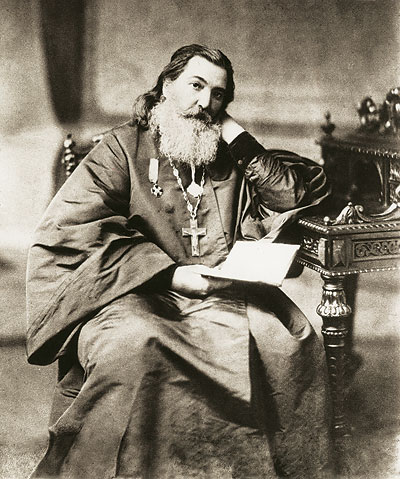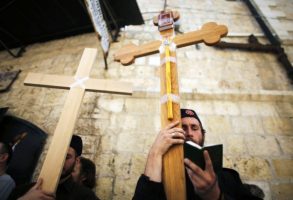Today, by God’s mercy, the Holy Forty Days have concluded. We have come a long way and we find ourselves at our destination. The Father’s house is already visible, where the joy of the bright day awaits us. Let us hasten to complete what we have begun. Fathers and mothers, encourage your children to finish their good podvig. Sons and daughters, help your fathers and mothers to enter into the joy of the Lord. But now we hear the sorrowful voice of the old and the young: Thy bridal chamber, O my Savior, I see all adorned, but I have no wedding garment so that I may enter it.
Poor strangers! Why is your clothing so old and improper? Have time or negligence made it so? Let your conscience, both human and Christian, answer this question.

Archpriest Valentin Amfiteatrov
But our mother, the Church, reaches out to you with her customary appeal. We hear this hymnody from her: Come, brethren; come all, great and small, enlightened and simple, young and old; come, let us be united in the spirit of faith and love and share the feeling of the suffering God-Man. The luminous bridal chamber is visible, but it is not possible to enter therein with a mind full of impure thoughts.
Unfortunately, many people’s thoughts and entire souls are never more filled with daily concerns than during this coming week. Concern for finishing various affairs before the feast, for the preparation of various items for the feast, distracts the mind on all sides and diverts the senses towards vain objects. For this reason the Divine Services of Passion Week are not attended in full; much of what is read in church — most importantly, the Evangelists’ narratives about the life of Jesus Christ — pass by without proper attention.
Yet Holy and Great Week does not require such a distracted mind from us. We will hear the good tidings of the entire life of our Savior. When is it not more fitting to view the whole of it than before its end? But will someone who is distracted, who does not even know his own life, be able to absorb the meaning of this life? We will be witnesses of the Lord’s final discourse with His disciples at the Mystical Supper; but can our hearts be inflamed with the fire of the love of Jesus if, like Judas, it will be where its treasure is? Therefore, it is not for the Lord’s sake, but for our very own sake, that we must in the present days collect our thoughts as best we can, and purify them; or else we will leave behind the Savior and remain with Judas, in despair; or, in Pilate’s judgment hall, left with washed hands alone; or in Herod’s palace, dressed up in our best clothes alone; but we will not rise with Christ, will not enter His bridal chamber of glory. Thy bridal chamber, O my Savior, I see all adorned, but I have no garment so that I may enter it.
What should we do about our everyday cares, one of you may ask. The feast is great, and the daily cares are great. We know about this situation, and we mourn: Christ is on the Cross, and Christians are from morning till night in stores. Christ, in pain, cries out I thirst, and drinks vinegar; while Christians prepare all manner of food and drink. At the very moment that Christ gives up His spirit, Christians barely take a break from their everyday concerns … How, after all this, can Christians in the end cry out the words: Thy bridal chamber, O my Savior, I see all adorned, but I have no garment so that I may enter it… We do not demand a change in the order of life, but a good Christian can find without difficulty the means of meeting all the demands of the feast without disturbing his mind and feeling, without losing sight of his Savior. The Apostles themselves went shopping. They prepared supper, and the equal-to-the-Apostle women bought aromatic fragrances; but regard how everything they did was decorous and pious. Why can it not be the same with us? Because we are children of the nineteenth century… because our vanity fabricates a great number of petty needs, and tortures itself and others with their satisfaction: petty people and petty feelings. The insatiability of our flesh magnifies beyond measure the needs of these bright days. The bright days are in and of themselves nourishing to the spirit and therefore require little food for the flesh. But we are so sensual that we cannot find love without victuals; we have fallen out of the habit of understanding delight and sweetness of heart without food. A Christian feast day is great and holy not for the great number of food; it is joyful not for the permission of shrill gaiety that takes one’s breath away… No, this is serving the body. Not in the name of the Risen Christ do people overeat and drink to satiety; not in the name of the Risen Christ do they array themselves to the point of temptation. A pure delight of the heart is a holy exaltation of the heart; it is truth, and peace, and joy in the Holy Spirit. Such feeling is unknown to the majority of us. If they were to visit us even once, we would not forget them, just as one does not forget the feeling of young, adoring, and pure love, the feeling of deep and unselfish friendship.
But inasmuch as we are poor in these holy feelings, it remains for me with a sad heart to repeat for all and to all the touching words of the prayer: Thy bridal chamber, O my Savior, I see all adorned, but I have no garment so that I may enter it. O Giver of Life, enlighten the vesture of my soul, that I might go into Thy house unrebuked; I shall worship toward Thy holy temple, I will take the cup of salvation, and call upon the name of the Lord. Amen.
Translated from Russian by Nina Zakharova
Edited by Hierodeacon Samuel (Nedelsky) and Isaac (Gerald) Herrin



















